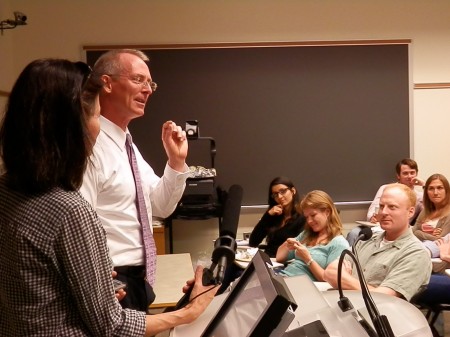Conservatism is not normally associated with green energy, but one group is aiming to change that.
On July 10 2012, GMU announced the formation of Energy Enterprise Initiative (EEI), the brainchild of former South Carolina Congressman Bob Ingles. With this new initiative, Ingles, a moderate Republican who was a casualty of the Tea Party juggernaut in 2010, will advocate for free market solutions to America’s energy & climate problems.
Alex Bozmoski, EEI’s Director of Strategy & Operations, described EEI’s philosophy as being “guided by conservative principles of free enterprise and growth, limited government.”
Among other things, the initiative proposes eliminating government incentives for solar panels & electric cars, but the catch is that EEI also wants to eliminate government subsidies for oil and gas companies. EEI will be housed at GMU’s Center for Climate Change Communication.
Bozmoski argues that it’s better in the end to pay the true cost of gas at the pump, rather than the price we pay now, which does not account for the costs currently concealed by multiple government subsidies that keep prices artificially low.
This initiative favors a revenue-neutral carbon tax that would be offset by cuts in other areas, such as income and capital gains, also known as a Pigouvian tax.
“What we’re really after is free enterprise–no one should be allowed to privatize profits while socializing costs.”
In fact, society already pays these costs—for example, when a coal-fired power plant is built, insurance premiums go up to reflect increases in illnesses and premature deaths related to soot.
Other climate costs are incurred by extreme weather events associated with climate change such droughts and wildfires.GMU Economics Professor Robert Cavender is skeptical that such a tax would be effective.
So long as property rights are well defined, he maintains, an optimal solution will arise through a bargaining process.
Although it would be difficult to coordinate such a contract between so many parties, “a truly market-based approach, I think, would consider this not a market failure per se but rather a huge profit opportunity.”
Additionally, he argues the tax could end up disadvantaging small businesses by forcing them to shoulder a larger share of the tax burden.
When asked how he would address the climate change skeptics in his own party, Bozmoski responded, “So long as you are willing to acknowledge that there isn’t a global climate conspiracy, it’s hard not to acknowledge you don’t want more carbon dioxide.”
He contends that the conservative approach to climate change is partly in reaction to the left, who are “sounding the clarion calls for big government to intervene in a looming climate catastrophe.”
Conservatives should not cede this ground, he added.
“We’re talking about a problem that progressives have used” to advocate for big-government solutions, but this is an issue that can be addressed with a revenue-neutral carbon tax and small-government approach.
According to Bozmoski, the current outreach is focused largely on younger conservatives on college campus.
These are people, he added, who are “fresh out of Economics 101, they are aware of externalities, and act as great ambassadors to their parents and grandparents.”







Comments